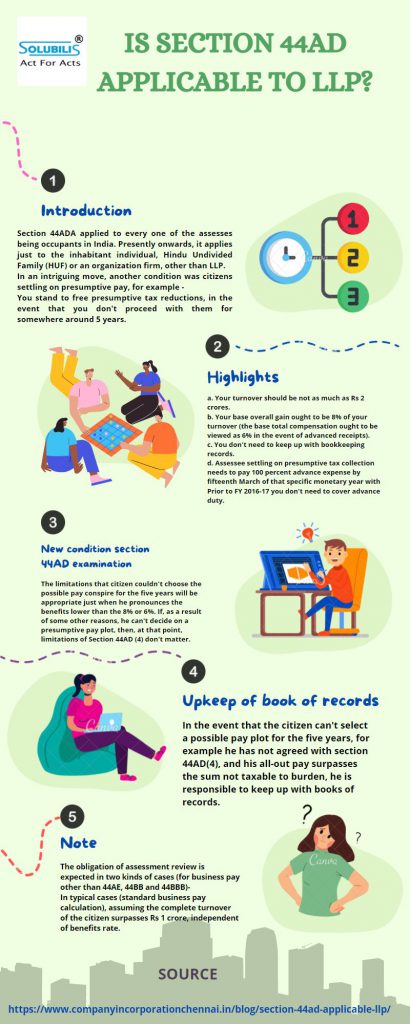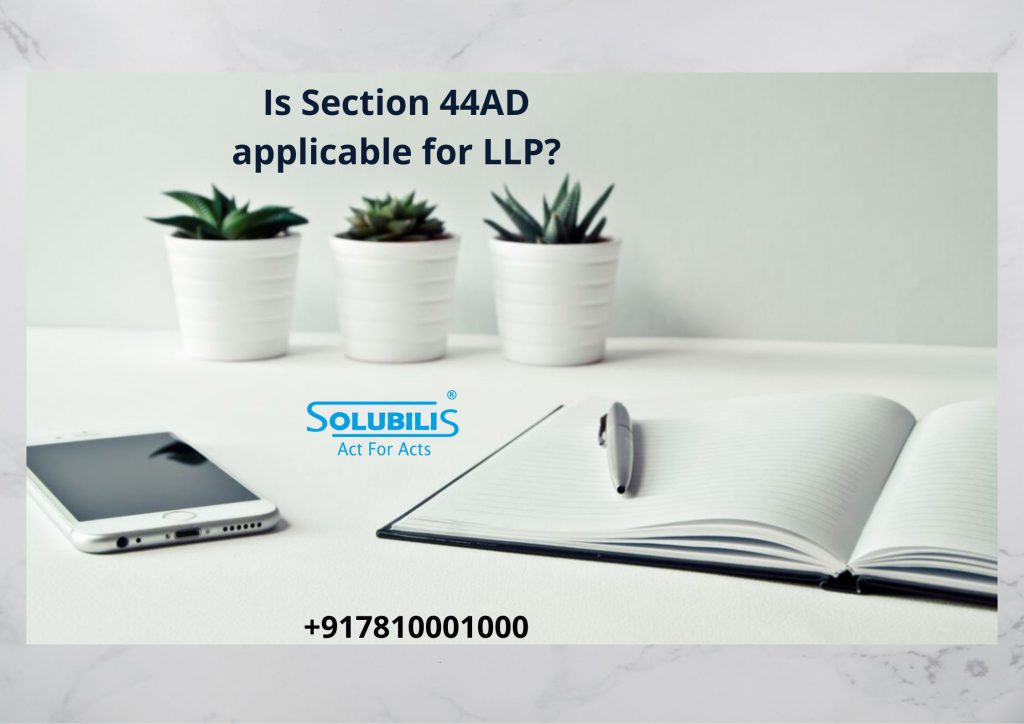The government has presented the possible taxation plot under section 44AD to give alleviation to the little citizens. Citizens occupied with any business other than handling, recruiting and renting alluded in section 44AE of the Act. Spending scheme 2021 update: Section 44ADA applied to every one of the assesses being occupants in India. Presently onwards, it applies just to the inhabitant individual, Hindu Undivided Family (HUF) or an organization firm, other than LLP
In an intriguing move, another condition was citizens settling on presumptive pay , for example –
You stand to free presumptive tax reductions, in the event that you don’t proceed with them for somewhere around 5 years.
Details of the extra condition
This extra condition has been added by subbing sub section (4) of 44AD which is – If you are selecting the presumptive scheme, you should
a. Proclaim your benefits according to presumptive scheme for something like 5 years in continuation.
b. Assuming that you choose to show and document benefits according to standard business (ITR-3) preceding the finish of these 5 years, you will lose presumptive advantages and be refused from possible tax collection for the resulting 5 years.
If it’s not too much trouble, note that 5 years will be included beginning the year in which you first record normal taxs (ITR-3) for such business. The public authority is deterring the citizens who abuse the scheme and continually change their choices frequently.
So assuming you settle on presumptive scheme, go on for a considerable length of time and if you have any desire to quit, you’ll be banned from continuing with the possible scheme for a time of 5 years. According to the progressions in the Budget of 2016, organizations with turnover up to Rs 2 crores can pick presumptive taxation plot. Prior this cut-off was Rs 1 crore.
Highlights of presumptive scheme –
a. Your turnover should be not as much as Rs 2 crores.
b. Your base overall gain ought to be 8% of your turnover (the base total compensation ought to be viewed as 6% in the event of advanced receipts).
c. You don’t need to keep up with bookkeeping records.
d. Assessee settling on presumptive tax collection needs to pay 100 percent advance expense by fifteenth March of that specific monetary year with Prior to FY 2016-17 you don’t need to cover advance duty.
e. You don’t need to get your bookkeeping records examined.
f. You can document your expense form in ITR-4 in a lot more limited and less complex form than ITR-3.
Experts have additionally been included the ambit of presumptive tax collection – read here exhaustively. Nonetheless, the time furthest reaches of 5 years condition applies just to organizations.
New condition (section 44AD (4)) examination
The limitations that citizen couldn’t choose the possible pay conspire for the five years will be appropriate just when he pronounces the benefits lower than the 8% or 6%. If, as a result of some other reasons, he can’t decide on a presumptive pay plot, then, at that point, limitations of Section 44AD (4) don’t matter.
Allow us to grasp the condition with an outline:
In FY 2018-19, the turnover of Mr H was Rs 1.5 crores. He proclaims his pay Rs 12 lacs and settles on a possible pay plot under section 44AD. The turnover of Mr H for FY 2019-20 is Rs 2.1 crore, and for FY 2020-21 is Rs 1.9 crore. Is it conceivable to decide on section 44AD in FY 2020-21?
Section 44AD (4) will draw in the year when the assessee pronounces the benefits under 8% or 6%. The citizen won’t be qualified to settle on a presumptive pay conspire for the following five years.
Be that as it may, section 44AD (4) won’t matter when the citizen can’t select the possible schemes due to non-qualification. For instance, gross turnover surpassing the possible scheme limit (for example Rs 2 crore), the citizen’s business doesn’t fit the bill for a possible scheme, and so on. In such circumstances, regardless of whether Mr H announces pay according to typical arrangements (not presumptive scheme) in the FY 2019-20, he can choose the possible scheme in the FY 2020-21. Nonetheless, he should proclaim benefits of over 8% or 6% for the FY 2019-20 in ordinary pay calculation
Upkeep of books of records and expense review
In the event that the citizen can’t select a possible pay plot for the five years, for example he has not agreed with section 44AD(4), and his all-out pay surpasses the sum not taxable to burden, he is responsible to keep up with books of records.
For better comprehension, let us take an illustration of Mr P.
Mr P runs a sole ownership firm, and his gross turnover is Rs 1.5 crore during the FY 2019-20. He settles on presumptive pay first time during the FY 2019-20 by announcing benefits over 8%. In FY 2020-21, his turnover is Rs 1.7 crore, yet he chooses to proclaim benefits under 8% and process pay according to ordinary arrangements of business (for example asserting every one of the uses). After calculation, his available pay is Rs 8 lakhs, for example over the fundamental exception limit. Is it safe to say that he is at risk to keep up with books of records and duty reviews?
Since Mr. P proclaims pay not exactly that characterized in the possible pay plot during the FY 2020-21, he picks to report his pay according to customary calculation. Thus, he isn’t qualified to choose a possible scheme for a very long time. In any of these five years, assuming his available pay surpasses the fundamental exception limit, he is at risk to keep up with books of records and do an assessment review for the important monetary year.
Henceforth, during the monetary year 2020-21, he didn’t agree with section 44AD (4), and his available pay is over the essential exclusion limit. He should keep up with books of records of his business and will be obligated for an assessment review.
Note:
The obligation of assessment review is expected in two kinds of cases (for business pay other than 44AE, 44BB and 44BBB)-
In typical cases (standard business pay calculation), assuming the complete turnover of the citizen surpasses Rs 1 crore, independent of benefits rate.
At the point when section 44AD (4) applies, and likewise, the all-out pay surpasses the essential exclusion limit.
The essential exclusion limit for people is Rs 2.5 lakhs, though it is nothing pay for firms and organizations.

Advance learning on Section 44AD (Theory)
To give help to little assesses, the Income-tax Law has consolidated a basic scheme generally known as Presumptive Taxation Scheme. There are two schemes, viz., the scheme of section 44AD and the scheme of section 44AE. An assesse it isn’t to take on these arrangements expected to keep up with the normal books of record and is additionally absolved from getting the books of account evaluated. In this advance learning we will cover the arrangements of the possible tax collection plot gave in section 44AD.
The scheme of section 44AD is intended to give help to little assesses occupied with any business (aside from the matter of utilizing, employing or renting of products carriages alluded to in section 44AE). The definite arrangements in such manner are as per the following:
Appropriateness of the scheme
The arrangements of section 44AD are relevant to such occupant assesse who is an Individual,
Hindu Undivided Family and Partnership Firm however not Limited Liability Partnership Firm.
Dissimilar to section 44AE, in the event of section 44AD there is a limitation on which classifications of
Assesses can choose the scheme. Just unambiguous classifications of occupant assesses as examined above can settle on this scheme.
Eligible business
The possible taxation plot under these arrangements can be decided on by the Eligible assesses who is occupied with any business (aside from the matter of handling, recruiting or renting merchandise carriages alluded to in section 44AE), whose turnover or gross receipts from such business do not surpass the constraint of review recommended under section 44AB (i.e., Rs. 60, 00,000 for the past year 2011-12 and Rs. 1, 00, 00,000 from the earlier year 2012-13). Further, these arrangements can be taken on by the assesses provided that he has not guaranteed derivation under section 10A/10AA/10B/10BA or under sections 80HH to 80RRB in the significant year.
Additionally, the arrangements of section 44AD can’t be an occupied with embraced by an assessed any calling as recommended under section 44AA or is carrying on an office business or is procuring pay in the idea of commission or financier.
The significant standards of the scheme is the turnover or gross receipts from the Eligible business.
To select the scheme the turnover shouldn’t surpass Rs. 1, 00, 00,000.
The arrangements of section 44AD can be taken on by the Eligible assesses who is occupied with any business (with the exception of the matter of handling, recruiting or renting of merchandise carriages alluded to in section 44AE and besides by the assesses who is occupied with any calling as endorsed under section 44AA or is running organization business or is procuring pay in the idea of commission or then again business).
Further, turnover or gross receipts from such business shouldn’t surpass the restriction of review recommended under section 44AB (i.e. Rs. 1, 00, 00,000 for the earlier year 2012-13).
Illustration
Mr. Soham is running an arrangement shop whose turnover is Rs. 99, 00,000 during the past year 2012-13. Accordingly, he fulfilled both the measures of the scheme and, consequently, he can take on the arrangements of section 44AD for his business of arrangement shop.
Scheme of computation of income
In the event of a willing assesses to select these arrangements, pay will be figured on an expected premise. The pace of calculation of pay on an expected premise is 8% of turnover or on the other hand gross receipts of the Eligible business for the earlier year.
Provisions connecting with different allowances/disallowances
Pay figured according to section 44AD (i.e., @ 8% of turnover or gross receipts of the Eligible business, for the earlier year) will be total compensation for the business covered under this scheme.
From the net gain processed as over, an assessed isn’t allowed to guarantee any derivation under sections 30 to 38 (counting devaluation or unabsorbed deterioration).
Arrangements if there should arise an occurrence of an association firm:
An assesses, being an organization firm, can guarantee further derivation of compensation and interest paid to its accomplices inside the breaking point indicated under section 40(b). All in all, in the event of an assesses, being an association firm, separate derivation from the total compensation registered according to possible taxation plot in regard of compensation and interest paid to its accomplices is permitted. Further, from pay processed at the previously mentioned rate, no prohibition can be made under sections 40, 40A and 43B.
Presumptive taxation
According to the Income-tax Act, an individual occupied with business or calling is expected to keep up with standard books of record and further, he needs to get his records inspected. To give help to little citizens from this dreary work, the Income-tax Act has outlined the presumptive tax collection plot under sections 44AD, 44ADA and 44AE. An individual embracing the possible tax collection scheme can proclaim pay at an endorsed rate and, thus, is feeling quite a bit better from monotonous occupation of upkeep of books of record and furthermore from getting the records examined.
The presumptive taxation scheme of section 44AD is intended to give help to little citizens occupied with any business (aside from the matter of employing, recruiting or renting of products carriages alluded to in section 44AE).
The presumptive taxation scheme of section 44AD can be taken on by following people : 1) Resident Individual 2) Resident Hindu Undivided Family 3) Resident Partnership Firm (not Limited Liability Partnership Firm) at the end of the day, the scheme can’t be embraced by a non-occupant and by any individual other than an individual, a HUF or an organization firm (not Limited Liability Partnership Firm).

